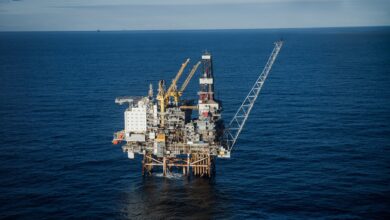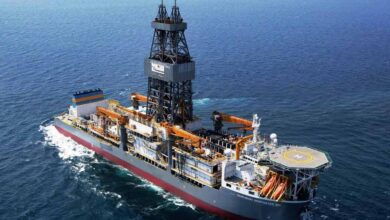Dew: On-time equipment delivery necessary for successful deepwater operations
By Katherine Scott, associate editor
“Approximately 75% of the existing deepwater discoveries have yet to be developed or produced. It’s going to take a lot more holes in the ground, and that makes us optimistic,” Lyndol Dew, Diamond Offshore senior VP worldwide operations, said at the 2013 GE Oil & Gas Annual Meeting on 28 January in Florence, Italy. Along with the Golden Triangle – US Gulf of Mexico, Brazil and West Africa – where the vast majority of deepwater drilling still occurs, emerging basins are also opening up elsewhere, Mr Dew said. “The frontier deepwater market is expanding in Australia, Indonesia, Malaysia, the vast majority of countries around the horn of Africa and a little further north in South America, and we believe they will also go into ultra-deepwater areas.”
At the same time, average offshore dayrates have increased from approximately US $300,000 a year ago to $500,000 today, even as newbuild activity continues strong, Mr Dew added. “The ultra-deepwater fleet has expanded four times since 2005,” he said. “And we have been sitting at $80- to $120-bbl oil for a very long time. It’s unprecedented in my 30 years experience to see this long of an uptime that effectively started in 2004.” Further, he believes this trend is likely to continue well into 2015. “With these commodity prices, the world’s thirst for energy is driving our customers to want to drill.”
In the latest newbuild cycle, more than $50 billion in funding is available for 159-plus newbuild rigs, he said. Diamond Offshore has four drillships and two semisubmersibles under construction that will be delivered over the next 18 to 36 months. Delivery time is critical, he stressed, adding that significant human and monetary capital is being committed to deliver the rigs on time and under budget. This is an area where Mr Dew urged vendors and service companies to do a better job.
Among offshore drilling contractors’ biggest equipment concerns, Mr Dew said, are vendors’ ability to deliver equipment as promised, their shortage of spares and a general obsolescence of software and systems, all of which can lead to downtime. “Downtime is our No. 1 problem in achieving our financial goals as a corporation,” he said.
Because drilling contractors work 24/7, Mr Dew said, service companies need to have people available to answer questions around the clock as well. Having personnel to assist is especially critical during the installation of new equipment. “They are the experts in their equipment, and they will help train us to make sure we understand how their equipment was designed to function and how we can maintain it.”
Citing BOP equipment as an example, Mr Dew pointed out that anytime the company is unable to prove that it works during routine testing, it has to stop and fix it. “Stop and fix is extremely expensive to the operator and to us. In deepwater, this could be a two- to three-week stall for a simple shuttle valve and could cut $10 million right off the top; huge monetary amounts are at stake.” Illustrating how costs and delivery times have gone up, he noted that in 2001 it cost $388,000 to purchase an annular BOP and 38 weeks to deliver it. By 2008 it was $480,000 and 100 weeks for delivery. Today, it’s $1 million for the same annular at 112 weeks for delivery. “If this is our reality, we’re going to have to be better planners at what our needs are in the future,” he said.
Further complicating the challenge is API Standard 53, which now dictates recertification of both onshore and offshore BOPs every five years. Instead of disassembling the equipment and sending it to shore for testing, offshore contractors are looking to partner with vendors who can recertify the equipment in-situ. “Come out to the rig, bring your equipment, let us work together to get this certification done,” Mr Dew said.
In fact, he believes one of the best technological innovations in the past five years is the ability to troubleshoot technologically advanced equipment from afar. “Now we have the capability of the internet for certain pieces of equipment, such as BOP controls where they can actually look at our system real time and see how it’s operating from their office and help us to troubleshoot.” This has resulted in significant savings, he said. “This is one of the best technological inventions and use of technology that we’ve seen in the drilling contractor space.”
Vendor reputations go a long way in helping operators choose the type of drilling rig they want to do business on, Mr Dew concluded, so “it’s important we get this right and we get it right together.” Diamond selects vendors based on trust, track record, technical expertise, economies of scale and ability to standardize, not necessarily price, he said. “Obviously it needs to be competitive, but we are more concerned about the future and the operational ability. 2% or 3% price differential pales in comparison to the downtime that we could suffer if we make the wrong choice.”




